Each of us in our own way, every day, whether we plan to or not, makes a difference. How much of a difference, how much of a legacy, and how positive or negative the impact is for others to determine. History. Her story. That part we have little control over.
We toss a pebble into a river, and we don’t know how that one ripple, along with all the others, will change that river over time. So it was with me in Kazakhstan. I could only toss in my pebbles. And then let them go. These are the stories of those pebbles.
Opening lines from Untold Stories From the Kazakh Steppe, Janet Givens
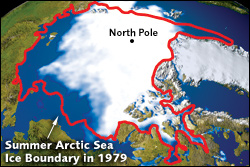
One of the more consistent dichotomies in the study of culture is that of INDIVIDUAL versus COMMUNITY cultures.
Those of us in the Western world are thought of as being more within the “individual” end of the continuum while those in the Eastern part of the world are considered more “community”–individual decisions and actions are based on what the larger group is doing. No single individual stands out from the collective.
What that means for today’s post, is that those of us in this country have grown up believing (among other things) that we have personal power; that what we do, as individuals, has impact; that we, as individuals, make a difference.
That idea was headlined recently in an article from the Natural Resources Defence Council (NRDC), “How to Stop Global Warming.”
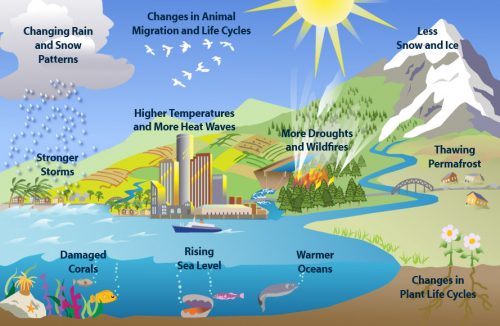
The NRDC is an organization I’ve been supporting since last November and it’s one I’m most impressed with. For the recap of how I came to choose it, see my post on How I Chose One Among the Many.
Here, in the NRDC’s own words:
The goal is simple. Carbon dioxide is the climate’s worst enemy. It’s released when oil, coal, and other fossil fuels are burned for energy—the energy we use to power our homes, cars, and smartphones. By using less of it, we can curb our own contribution to climate change while also saving money.
Theirs was a call to individuals to do what they can. Individuals; not a community at large. Not our government. As though each individual reader might make a difference. People, everyday people like you and me.
So, I was wondering, How are we doing?
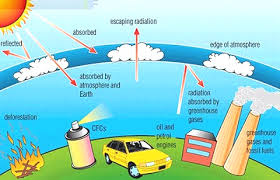
Here are some thoughts I’ve pulled from various articles by the NRDC, mostly from “How to Stop Global Warming” with a bit of reorganization to make it easier to navigate, and a few others as noted.
A. SPEAK UP Talk to your friends and family. Talk to your MoC (Member of Congress). Don’t stay silent on this most important issue.
- Talk instead of type. As important as it is to share stories on social media, it’s even more important for your MoC to hear from you. Here are suggestions from the NRDC for how best to do this.
- Another article from NRDC gives five questions you can ask your local leaders.
- And, if you come upon someone who supports our withdrawal from the Paris Accord, here are some pointers to help you converse. (Just remember to LEAP FROG)
- The National Center for Science Education (NCSE) launched a pilot program last year that aims to bring science to public spaces. Here’s the NRDC article about talking to climate deniers.
- Here are other ideas from NRDC to “make change globally by acting locally.“
Speaking up not your thing? OK. Turn your attention to your home.
B. IN OUR HOMES
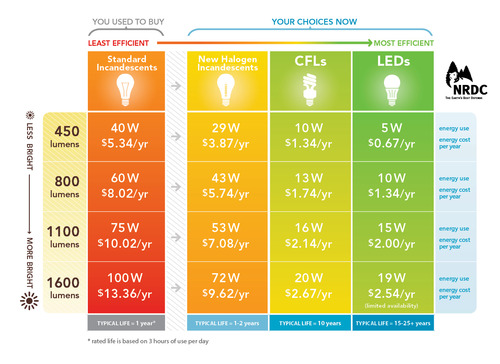
- Convert your light bulbs to LEDs. This is the easiest and cheapest step in reducing the carbon pollution fueling climate change. I know they seem expensive. But, when I converted all our bulbs in the Chincoteague house one year, we saw a dramatic decrease in our electric bill. The NDRC says, “A 10-watt LED that replaces your traditional 60-watt bulb will save you $125 over the light bulb’s life.” Take a look at the graph above for comparison, then go on; just start. Maybe take one room at a time.
- Weatherize, weatherize, weatherize. Enough said.
- Pull the plug(s). How many devices are currently plugged into outlets throughout your home? The article claims the average is 65. Sixty-five devices currently using energy even when they are not turned on. “This ‘idle load’ across all U.S. households adds up to the output of 50 large power plants in the U.S.” Wow. Here’s an entertaining short video (if you are into vampires) from TreeHugger.com explaining how Americans waste more energy when their devices are turned off than when they are on (length of time is the important variable).
- Power Your Home with Renewable Energy. Beyond adding solar panels or your own backyard windmill, your electric company may already be producing electricity through renewable means. Check if your electric company has been certified by Green-e Energy. If not, you might consider changing electric companies (the producer, not the distributor).
- Invest in energy-efficient appliances. Not sure which to replace first? Anything that HEATS is going to use a lot more energy. So, replace driers, ovens, heaters, etc. before refrigerators or washing machines. Watch for that Energy-Star label too.
- Actually eat the food you buy and make less of it meat. Did you know that 40% of the food we grow, process, package, and transport ends up in a landfill? I didn’t either.
- Reduce water waste. Water will be what wars are fought over next.
Getting the hang of it? Good. Let’s turn to our travel habits.
C. IN OUR CARS
- Walk more. That’s got additional side benefits, too.
- Drive a fuel efficient vehicle. I bought my first Prius sitting in the living room of our apartment in Kazakhstan. Yes, Toyota makes it quite easy to order online. Back then there was a wait of a few months, so it worked out quite well. This week though, we’ll be going one better. Woody and I will become a one car family for the first time in over ten years. Stay tuned for details.
- And keep the tires fully inflated.
- Take the train once in awhile. Anything but flying. But if you have to fly, take a look at what’s next on this list.
I had no idea individuals could buy carbon offsets. I’m not even sure how I feel about this. But, the article I linked to (also from NRDC) gives a good overview. Check it out.
You might also check out this list from Mount Holyoke, on Energy Myth Busters. They take eight common beliefs about energy consumption and give us the latest take.
OK. That’s it for what we as INDIVIDUALS can do to reduce our own carbon footprint. Well, there was that suggestion about having one fewer child, but I figured my audience is well beyond that stage of life. So, I focused on those that we could all do, now. TODAY.
What have I missed?

For the full article, The Impacts of Climate Change on Human Health in the United States: A Scientific Assessment click on the title.
To return to the INDIVIDUAL/COMMUNITY model that I began this post with, I’m wondering how many of us truly live our lives based on the idea that individuals matter; that each of us, in our own way, makes a difference? Or, do you hold back, relying on someone else to do it? Someone else more knowledgeable, perhaps? Someone else with more time? Someone, anyone, else?
How much can one individual do? Turns out, quite a lot. I love this quote from psychiatrist Lisa Van Susteren, a frequent speaker on the psychological effects of climate change, in an article entitled, “Banishing the Climate Change Blues.”
“We tend to focus disproportionately on what the federal government can do for us, but there’s something else we can ask that’s fundamental to our democracy,” Van Susteren says. “That is, what we can do for each other? This is fundamentally our gift to each other, to be the best possible citizens we can be.”
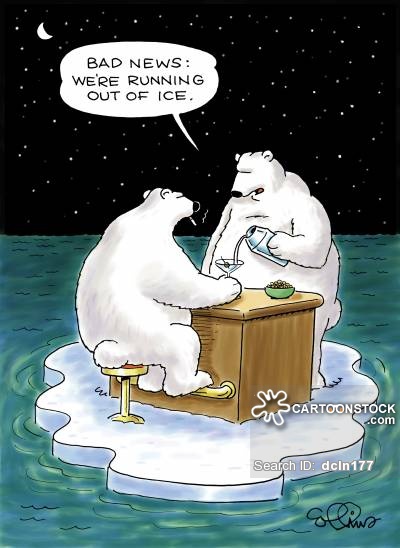
How about you? What can you add today to what you are already doing?
Want to know more about the NRDC? Visit their About Page here.
Merril Smith
Thank you for this, Janet. There are great tips here, and you’ve given me much to think about it. (I’m still pondering though, a tomato with a chocolate aroma.)

Merril Smith recently posted…Souls Amongst Us, Drifting
Janet Givens
Thanks Merril. In putting this together the other day, I realized I’d not replaced all my bulbs. I did so in Chincoteague years ago. But not here. So today I am systematically assessing my light bulb situation and then driving to Lowe’s.
Marian Beaman
You are a can-do woman, Janet, with irrefutable evidence here.
I do my bit with turning out lights, conserving water, and (soon) replacing my old car with something more fuel-efficient. By the way, I often walk to the grocery story (7/10 mile from our house) with my back pack: Keep fit and conserve gas. We do what we can and now possibly facing the effects of another hurricane.
Marian Beaman recently posted…Anything But Simple: Luci Miller’s Mennonite Life and Book Giveaway
Janet Givens
Stay safe, Marian. And know you are on my mind.
Laurie Buchanan
Janet — I love this post. It’s rich with practical tips that each of us can do weave into our lifestyle.
Our home is located so that we can walk and ride our bicycles almost everywhere we need to go locally.
We live in a 500 square foot carriage house that’s heated with geothermal water (we live off of Warm Spring Avenue — the name comes from the hot springs underneath us).
Laurie Buchanan recently posted…On the Rise
Janet Givens
Yes indeed. I forgot to mention bikes! It’s not something most of us here in Vermont turn to. Though when I lived in Philly, I biked to work at Penn most days. Geothermal, too. Good for you. My sense of geothermal is that it does a great job with cooling, but not so much with heating (in REALLY cold climates; a supplement may be necessary). Have you found this?
Janet Givens recently posted…How Much Can One Individual Do?
Tim Fearnside
Great post, Janet — and a good reminder of how much more I can and should be doing. I appreciate the paradigm of “individual” versus “community” action. If we ever solve this problem, it’s going to take both, I think, although there’s only one that I can largely control. Solar panels have been on my list of things to investigate for some time. Perhaps this is the kick in the pants I need to look further into it. Best, T
Tim Fearnside recently posted…On the Human Chains that Bind Us
Janet Givens
We are thrilled with our solar panels, Tim. But we got them at a time when both our state and the Feds were offering incentives. It was pretty much a no-brainer. And soon after, they were doing so well and we were accumulating such a credit (which we knew we’d never get back in cash) we changed our domestic hot water to electric. Now we pay about $40 once or twice in the late winter. That’s it. For two houses and a barn. Too bad the solar panels still come from China though; that’s why they are so cheap.
I’m off soon to get those new LED lights. Thanks for adding your voice.
Janet Givens recently posted…How Much Can One Individual Do?
Nancy Drye
Great post! Loads of good info. And another vote for bikes–even as a senior (medicare-eligible) person, I can bike almost everywhere I need to go here in Philadelphia–groceries, work, pool/gym, entertainment, socializing–and the $ savings are incredible. (I joke that my early partial retirement was funded by biking–the avoidance of car and parking expense.) Not to mention healthier and fun. But media reports on the threat of Hurricane Irma and the demand for bottled water made me wonder why folks aren’t just filling their own bottles with drinking water (and tubs or buckets with flush water). It’s free and avoids the scourge of all those plastic bottles.
BTW, the Friends [Quaker] Center on 15th St in Philadelphia went geothermal a few years ago…and that’s a big (old, retrofitted) building in a temperate climate. And my own home has a lot of passive solar features–a Victorian with lots of south facing windows and insulating shades…we let the sun in when we need warmth, and keep it out when we don’t…and have a rooftop skylight for ventilation, letting out hot air. It’s amazing what a difference these features can make. But you have to think of that when you buy your house, avoiding northern exposure ….unless you’re an artist who seeks north light!
Janet Givens
Hi Nancy, Welcome. I’m so glad to have you join us. Thanks so much for adding that “single use” plastic issue. That’s one we tried to adopt a year or so ago. It’s hard! Is it California that has banned plastic bags? That feels like a whole other post on what’s happening to our oceans. Or, that line from The Graduate, “One word to you … Plastics. … There’s a great future in plastics.” Silly us thought they were referring to phony and false; little did we know how big the plastic industry would become. Sigh.